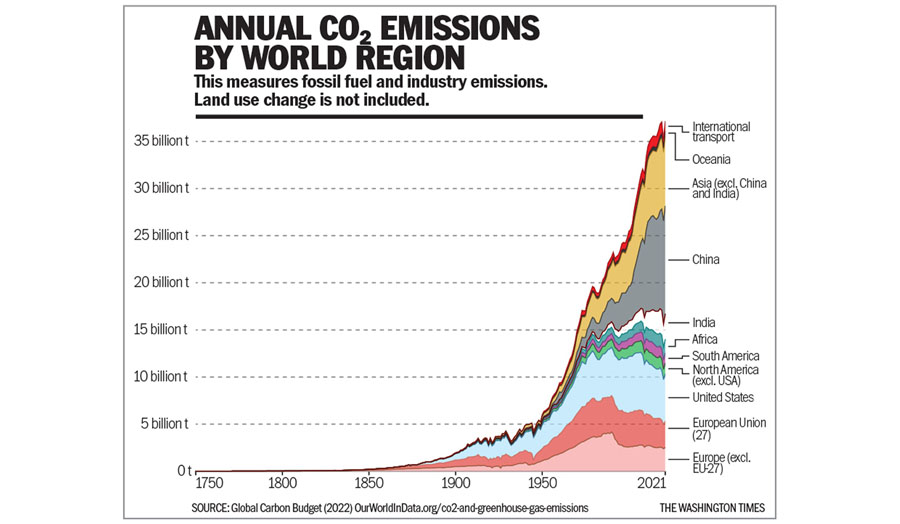OPINION:
The late humorist P.J. O’Rourke used to quip that “everyone wants to save the world, but no one wants to wash the dishes.”
The same can now be said for the traditional environmental groups that seem to have lost their way.
Green groups are supposed to be about keeping our rivers, lakes and streams clean. They are supposed to be about fighting litter and keeping toxic chemicals out of the air. Their job is to maintain the beauty of our national parks and save elephants and tigers.
Not anymore. The New York Times recently reported in a disturbing headline: “Environmental Groups Cut Programs as Funding Shifts to Climate Change.”
In other words, the left’s climate change hysteria and its campaign to end fossil fuels are interfering with a commonsense green agenda. Worse than that, the climate agenda is in some ways making the environment worse.
According to the Times story: “A significant shift in donor contributions to nonprofits fighting climate change in recent years has left some of the nation’s biggest environmental organizations facing critical shortfalls in programs on toxic chemicals, radioactive contamination and wildlife protection.
“The Natural Resources Defense Council, the Sierra Club, Defenders of Wildlife and the Environmental Working Group, which have been at the forefront of efforts to clean up wastewater, regulate pesticides and adopt tougher standards for atomic power plants, are facing similar financial problems.”
This is all being driven by a mad pursuit of billions of green dollars for stopping global warming. That is, they are chasing and spending money on a cause — changing the planet’s temperature — on which they can have almost no impact.
How much money are we talking about? In 2022, environmental groups spent and raised $8 billion on climate change activities. That doesn’t fully include the tens of billions of dollars that central governments are spending on climate issues.
All of this money has funded scores of ritzy climate change conferences around the globe, as well as virtue-signaling protests, propaganda campaigns in schools, and a war on oil, natural gas and coal, cars, stoves and air conditioners. And now eating meat is verboten.
Yet the climate agenda is often pushing policies that destroy the planet rather than save it. In poor countries, the war on fossil fuels has meant that villages are burning wood or even feces. Instead of spending money on ensuring that the world’s poor have safe drinking water, we are spending billions of dollars pushing windmills and solar panels.
These “green energies” use 10 times as much land as a natural gas-powered plant. The landscape of America is being paved over and industrialized in our pursuit of zero-carbon policies. How is that a pro-environment policy?
Moreover, raising the cost of energy makes people poorer, which is counterproductive if we want to keep the planet clean. The richer a country, the more money it spends to clean the air and the water, and to preserve wildlife.
The bigger question environmentalists should be asking is: What has the half a trillion dollars spent on climate change bought? No measurable results. See the attached chart.
Fossil-fuel use reached an all-time high in 2022 and 2023, and carbon emissions have been climbing rather than receding. The more governments spend, the more money the United Nations insists we need to spend. The latest U.N. report says more than $4 trillion needs to be spent in the coming years to combat climate change.
With that much money, we could end world hunger and illiteracy.
Instead, the fanatics in the Biden administration and the billionaire donor class demand that we save the planet from carbon emissions at any cost, and if that means diminishing funds for fighting real pollution that kills people, so be it.
• Stephen Moore is a senior fellow at The Heritage Foundation and an economist at FreedomWorks. His latest book is “Govzilla: How the Relentless Growth of Government Is Devouring Our Economy.”





Please read our comment policy before commenting.